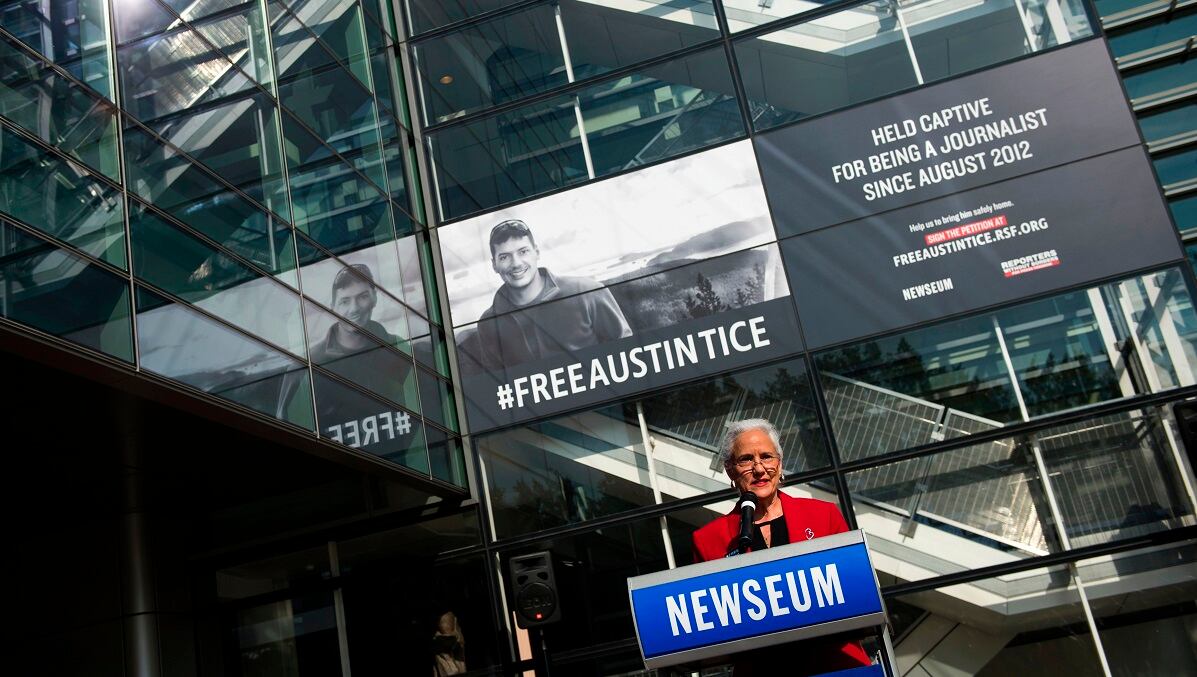A decade has passed since Marine Corps veteran Austin Tice was taken hostage while working as a freelance journalist in Syria.
Three administrations, from President Barack Obama to President Donald Trump to now President Joe Biden, have held office while Tice awaits his homecoming.
But recent hostage swaps with Russia have Tice’s family hopeful that there could be a new roadmap for bringing him back.
Austin Tice’s capture
Tice served as a Marine officer from 2005 to 2015, with multiple Middle East deployments before concluding his time in the Marine Corps Reserve as a captain. He was attending Georgetown University’s law school and traveled to Syria to report on the civil war in the country during a summer break in May 2012.
RELATED

Days after his 31st birthday he was in Darayya, Syria, scheduled to leave for Lebanon and return home. Official accounts place his capture by an unknown terrorist group in Syria as Aug. 14, 2012.
Five weeks after his capture, a 43-second video emerged with footage of Tice in a blindfold and surrounded by armed men on a rocky desert hillside.
That short video and a November 2018 statement by then-Special Presidential Envoy for Hostage Affairs Robert O’Brien saying that officials believed Austin was still alive are the only publicly released evidence of Austin Tice’s status.
Austin Tice’s parents, Debra and Marc Tice, have pushed, often bluntly, for the U.S. government to do whatever it takes to bring their son home.
Debra Tice told Marine Corps Times in a late July phone interview that she sees Biden’s prisoner swap which freed Marine veteran Trevor Reed in April after three years in Russian prison as a kind of blueprint for a new approach for Austin Tice’s return.
“I see it as a miracle that Trevor was released,” Debra Tice said. “I feel like Trevor paved the way for Austin.”
That is in part because if the U.S. government can manage to conduct prisoner swaps with Russia, which engages in a war that the United States opposes and is actively countering through support to Ukraine, then she sees it as possible to negotiate with other opponents, such as Syrian leaders.
Marine Corps Times spoke with a senior official in the Biden administration, who shared a statement on background, citing the sensitive nature of hostage negotiations.
“The United States has engaged extensively to try to get Austin home, including directly with Syrian officials and through third parties,” the official provided in an email statement.
“Unlike in other situations where Americans are detained abroad, for many months, the Syrian government has not agreed to senior-level meetings to discuss Austin’s case, nor has it ever acknowledged holding him,” the official wrote. “We will continue to pursue every avenue for securing Austin’s release.”
Fighting for release
Both the Reed and Tice families faced, and the Tice’s continue to face, severe struggles maintaining public attention on their cases.
Reed was arrested following a drunken episode after a party in Moscow shortly before he was to return home in 2019. Russian police detained Reed and claimed that during a transport to a holding facility he assaulted them, causing their vehicle to swerve in traffic.
Reed was held for a year in jail before a trial that convicted him on what one U.S. official called “laughable” evidence. Reed was sentenced to nine years in prison.
As the Ukraine war escalated, with rising diplomatic tensions between the U.S. and Russia, the Reed family feared that any efforts to release him would get harder.
The Reed family posted themselves along the presidential motorcade route during an early March 2022 trip Biden took to Texas. When that didn’t work, Reed’s parents demonstrated outside the White House to gain the commander-in-chief’s attention.
The parents had a meeting with Biden in late March 2022 and Russian officials released Reed in a prisoner swap with Russia in late April.
And Reed was not an isolated case.
Secretary of State Anthony Blinken said publicly in late July that his office is actively working and open to negotiating with Russia to return another Marine veteran, Paul Whelan, who has been detained in the country on accusations of spying since 2018 and received a 16-year prison sentence in 2020.

On April 30, Debra Tice attended the annual White House Correspondents’ Dinner.
During the event, Steven Portnoy, president of the White House Correspondents Association, introduce her to the audience and Biden, making a direct connection between Reed’s recent return and Austin Tice’s ongoing case.
“Mrs. Tice’s son, Austin, is a colleague of ours at the Washington Post, McClatchy and CBS, and he should be here with us tonight. But he’s been held captive in Syria since 2012.
As we take note of Trevor Reed’s return, our thoughts tonight is with Austin Tice, and our collective hopes are that after nearly ten years in captivity he will soon return home safely to his mother, his father, his colleagues and his friends.”
Days later Debra and Marc Tice attended a meeting with Biden at the White House.
It seems, Debra Tice said, like a double standard. The United States is actively funneling support to Ukrainian fighters. And yet the U.S. was able, within a brief period, to arrange a prisoner exchange.
RELATED

In late May 2022, Biden Administration officials met with Maj. Gen. Abbas Ibrahim, Lebanon’s intelligence chief, asking him to work as a go-between for the two nations on Austin Tice and other Americans being held, The Washington Post reported.
Sam Farran, a retired Marine Corps warrant officer who in 2015 was held for six months by Houthi rebels while working as a private security contractor in Yemen, told Marine Corps Times he has been following the Tice case and he has doubts about whether Ibrahim will be effective.
“It’s very important to put the right person in the right place that has these connections that can communicate to the other side what can be done,” said Farran, a Lebanese-born U.S. citizen.
Farran was released, he said, primarily because the then-sultan of Oman got involved to communicate with U.S. officials and Houthi rebels who had taken him and others hostage. Ibrahim has connections in the region, but likely not enough influence.
Also, his Houthi captors were desperate. Syria is not, he said.
“The difference is my captors were a broken organization,” he said. “They were willing to negotiate for anything to capitalize on.”
U.S. adversaries Russia and Iran both back Syria.
“They can demand whatever they want,” Farran said. “Until (Syria) can get what they can capitalize on, they’re not going to do anything.”
Todd South has written about crime, courts, government and the military for multiple publications since 2004 and was named a 2014 Pulitzer finalist for a co-written project on witness intimidation. Todd is a Marine veteran of the Iraq War.




